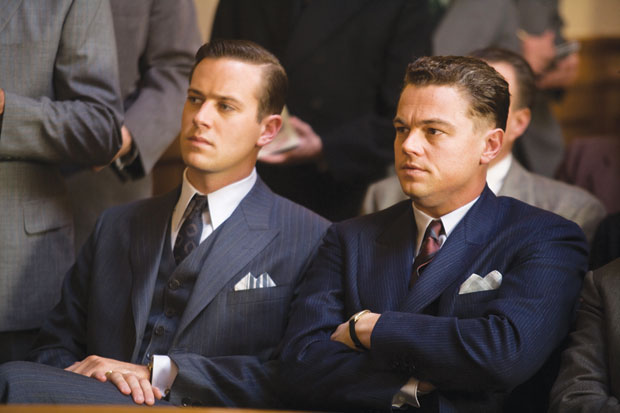‘J. Edgar’ tries — and almost succeeds — at being ‘Brokeback’ for G-Men
………………..
3 out of 5 stars
J. EDGAR
Leo DiCaprio, Armie Hammer, Judi Dench. Rated R. 145 mins. Now playing in limited release.
………………..
Before he became the nation’s most famous lawmen (one who never carried a gun or made an arrest), J. Edgar Hoover’s greatest governmental accomplishment was organizing the system for card cataloging the Library of Congress, and in Dustin Lance Black’s screenplay for J. Edgar, that speaks volumes. Hoover thought of everything — books, people, information — as things to be categorized and managed. “Believe in the individual” Hoover (Leonardo DiCaprio) says near the end of the film, without a hint of realization that his entire career was a slow repudiation of that principle.
Hoover was, simply, a scary son of a bitch, a homegrown Torquemada clothed with the mantle of democracy.
That’s not something I’m sure J. Edgar fully captures. Hoover was an innovator of law enforcement: He believed in process, in the value of centralizing information like fingerprints, and of preserving evidence in situ.
But as with many well-intentioned people who rise to unbridled power, he abused it. Personal and political enemies were targeted, if not outright blackmailed; the constitution became more barrier than guideline. You can see how Hoover’s FBI laid the groundwork for the Bush Administration’s unironic use of “extraordinary rendition” as a euphemism for torture; the U.S. doesn’t torture as a precept, so anything we do in the name of safety must be proper.
J. Edgar gets off to a shaky start, but it grows on you. Our first sight of Hoover is of DiCaprio pinched into an overdone old-man latex mask that looks comical, like Lord Voldemort in a Brooks Bros. suit. The film is bookended by the sunset of Hoover’s life while recording his memoirs, and the start of his career, only until about 1935; that leaves a generation of villainy during the Cold War and Civil Rights Movement almost untouched by Black and director Clint Eastwood. Some things had to come out, of course; but the gap feels gaping.
None of this is to say Black’s screenplay doesn’t succeed on several levels. He portrays Hoover as a spiritual brother of Norman Bates: Emotionally arrested, mother-obsessed (a scene where he dressed in his dead mom’s clothes is singularly creepy) and expressing his frustrations in inappropriate ways.
He also presents us with one of the most perversely touching love stories of the year: The very public but very secret romance between Hoover and his aide, Clyde Tolson. Tolson, played with model-good-looks and a seductive, pantherish stealth by Armie Hammer, humanizes Hoover. He serves, often ineffectively, as the moral guidepost, the floating conscious of a notoriously paranoid influence peddler who saw criticism as subversiveness and liberalism as treasonous. Eastwood is best directing as he hints, for the better part of an hour, at the sexual energy between them. It’s on the personal level that J. Edgar becomes something more than a biopic — it becomes Brokeback Capital Hill, a romance among G-Men.
Hammer is the most compelling actor on the screen, followed closely by Judi Dench as the most unnerving mom since Angela Lansbury in The Manchurian Candidate. But Leo falls flat. He doesn’t convey Hoover’s demagoguery with enough vitriol; it’s like he’s afraid of coming off as the villain.
Ultimately, maybe it doesn’t matter. Hoover’s political legacy speaks for itself; we have J. Edgar to remind us of the sad tragedy of being in the closet, and how even in unlikely times, love finds a way.
This article appeared in the Dallas Voice print edition November 11, 2011.














